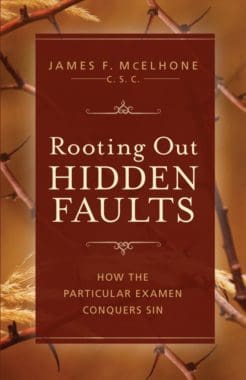The Reading of the New Testament
The Particular Examen begins ordinarily with the following prayer:
O Jesus, living in Mary, come and live in Thy servants,
by the spirit of Thy holiness, by the fullness of Thy
power, by the perfection of Thy ways, by the truth
of Thy virtues, and by the communication of Thy
mysteries. Triumph over all enemies by Thy Spirit for
the glory of the Father. Amen.
There follows immediately this short prayer of St. Ephrem:
O Lord Jesus, open the eyes and ears of my heart, that I
may understand Thy oracles and perform Thy holy will.
A chapter, or portion of a chapter, in the New Testament is then read: first, to help us to increase in knowledge and love of our Faith; secondly, to help us to know our Lord better and love Him more ardently; thirdly, to help us to serve God more and more faithfully; fourthly, to help us to aid others in a spiritual way.
First, to read the Bible is to grow in knowledge and love of our Faith. The Bible is the Word of God. It is one rule of faith, the other being the infallible teacher—the Church; they are not. separated as rules of faith; they are one. Now, it is true that we have been taught what the Bible teaches: in catechism, in sermons, in conferences, through monition and spiritual direction, by counsel in Confession. No one could hope through a sermon or two to receive and understand all that the Church teaches; neither should one expect through one or a few readings of the Bible to receive and understand all that it teaches. The reading of it with prudent guidance should ever be helpful.
Secondly, to read the Bible is to grow in knowledge and love of our Lord, whose life and works the New Testament describes. We follow Him from His birth to His Ascension. All along the way, we listen to what He teaches and we believe. From the very start, we acclaim: “Indeed, Thou art the Son of God!” We believe all that He teaches about right and wrong, sin and virtue, about His mission: His life and works and death and Resurrection and Ascension. Our faith is increased; our knowledge of that faith expands; our love for it develops. The spirit of it falls upon us, as the mantle of Elijah fell on Elisha, and we cannot help loving Him who is responsible for that spirit.
Thirdly, to read the Bible is to be anxious to copy our Lord, our Exemplar, our perfect and divine Model. He who studies Him with eyes of faith is urged to love Him. He who loves Him will feel more impelled to read about Him. The spirit of His presence enters our hearts. We strive to catch something of the goodness that was His. We yearn to think as He thought, to speak as He spoke, to act as He acted. In our human and limited way, we endeavor to practice His perfection.
Fourthly, to read the Bible is to use an efficacious means of developing ourselves so that we may help others in a spiritual way. We are to teach others. In teaching them, we are giving what the Bible teaches as explained by the Church. Consequently, the better we know our Faith, the more we know and love our Lord; the more we strive to copy Him, all the more shall we help others to salvation through goodness.
For such reasons we should read the Bible or listen with strict and humble and docile attention when we hear it read. We should try to acquire its spirit even by memorizing, word for word, the truths it unfolds. Then will the Word of God be in our minds and ever ready for use. Thus we shall think of the glory of God, our own sanctification, and the salvation of our neighbor.
+
This article is adapted from a chapter in Rooting Out Hidden Faults by Fr. James F. McElhone, CSC which is available from Sophia Institute Press.
Art for this post: Cover and featured image used with permission.





